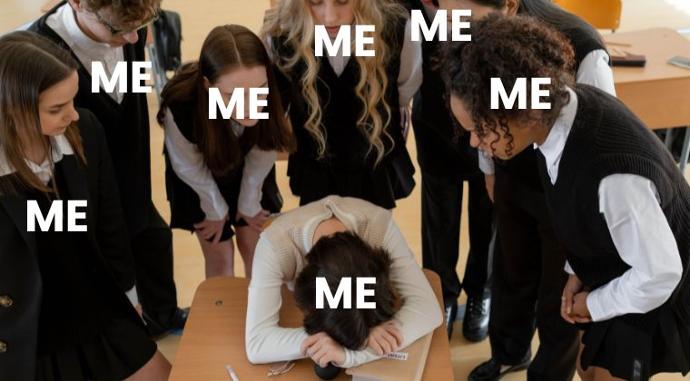Despite ongoing discussions about mental health challenges faced by early childhood educators, research indicates that many individuals within the education sector still experience significant difficulties. Studies demonstrate that early childhood educators are less likely to seek help for mental health conditions compared to professionals in other fields (Acker, J., & Hill, P. 2021). The education system and societal expectations also impose rigid standards on educators, creating limited opportunities for vulnerability and emotional expression (DeCarvalho, R., et al. ,2019). Consequently, many early childhood educators struggle with their mental well-being, internalise harmful narratives, and adopt unhelpful thinking patterns that hinder their personal growth and overall happiness.
Reacting vs. Responding
When we are filling burnt out, or have empty Cups, one common trap that we can fall into is reacting to situations instead of responding to them. Reacting involves impulsive and instinctive behaviours, whereas responding entails thoughtful and deliberate actions. By cultivating self-awareness, analysing our thoughts, and consciously choosing how to respond, we can break free from reactive behaviour driven by intense emotions. Responding with mindfulness and emotional intelligence enables us to navigate situations more effectively and cultivate healthier connections.

Unhelpful Thinking Styles
To transition from reactive behaviour to thoughtful responses, it is crucial to address unhelpful thinking styles that contribute to this pattern. The following thinking styles are common:
1. Black and white thinking: Sometimes situations are viewed as either all good or all bad, limiting perspective and problem-solving abilities. Embracing shades of grey and acknowledging the complexities of life can lead to more balanced thinking and enhanced mental resilience.
2. Mental filter: Sometimes we employ a mental filter that focuses solely on negative aspects, filtering out positive experiences or feedback. This cognitive distortion skews perception, leading to a constant state of dissatisfaction. By consciously redirecting attention to the positive aspects of life, educators can break free from this self-imposed negativity and cultivate a more optimistic mindset.

3. Jumping to conclusions: Making assumptions without sufficient evidence is an unhelpful thinking pattern that many people adopt. This habit can strain relationships and create unnecessary conflicts. By practicing open-mindedness and seeking clarification, educators can avoid misunderstandings and foster healthier connections with others.
4. Emotional reasoning: Sometimes, we allow our emotions to dictate our thoughts and actions. Assuming that emotions always reflect reality can cloud judgment and hinder effective decision-making. By recognising that emotions are not always an accurate reflection of reality, educators can navigate situations with greater clarity and objectivity.
5. Overgeneralising: Sometimes we tend to draw broad conclusions based on limited experiences. This type of thinking can limit personal growth and prevent us from seizing new opportunities. By challenging these overgeneralisations and recognising the unique nature of each situation, educators can open themselves up to positive change.
6. Disqualifying the positive and magnification: Sometimes educators tend to downplay or dismiss positive experiences, achievements, or compliments, while simultaneously magnifying negative aspects or failures. This self-deprecating mindset can erode self-esteem and hinder personal growth. By consciously acknowledging and embracing positive aspects of their lives, educators can cultivate a more balanced perspective and boost their self-worth.
7. "Should" statements and labeling: Reflecting on often unreasonable standards, statements like "I should do this" or "I must do that" frequently lead to feelings of frustration, shame, or guilt. Labeling oneself as "incompetent" or "a failure" only adds to the negative cycle. By challenging these rigid expectations and practicing self-compassion, educators can break free from the shackles of self-judgment and foster a healthier mindset.

Transformation Process
To address unhelpful thinking, the key lies in recognising and identifying them as being unhelpful and transforming them into healthy habits. The process involves:
1. Awareness: Cultivate awareness of one's thoughts and emotions. Pay attention to patterns and themes that arise in the mind. Notice when negative or unhelpful thoughts arise and how they impact emotions and behaviors.
2. Mindfulness: Practice mindfulness to observe thoughts without judging them. Instead of getting carried away by them, create a space where thoughts can be objectively observed.

3. Questioning automatic thoughts: When unhelpful thoughts arise, question their validity and accuracy. Ask whether the thought is based on facts or assumptions, whether there is evidence to support or refute it, and what alternative perspectives or explanations are possible.
4. Gathering evidence: Engage in evidence gathering to challenge unhelpful thoughts. Look for evidence that supports or contradicts automatic thoughts. Consider alternative explanations or interpretations of the situation.
5. Reframing: Once evidence is gathered, reframe thoughts in a more balanced and realistic manner. Replace extreme or negative thoughts with more rational and constructive ones. Consider alternative perspectives that are more aligned with reality.
6. Cognitive restructuring: Practice cognitive restructuring by actively replacing unhelpful thinking styles with healthier and more adaptive ones. Consciously replace negative self-talk with positive and affirming statements.
7. Practicing self-compassion: Throughout the expansion process, it's important to practice self-compassion. Treat oneself with kindness and understanding, acknowledging that unhelpful thinking patterns are common and can be challenging to overcome. Be patient and gentle while working towards cultivating healthier thinking styles.
What now?
By understanding and addressing these unhelpful thinking patterns, early childhood educators can make a conscious shift from reactive behavior to thoughtful responses. This transition requires self-awareness, practice, and a commitment to personal growth that won't happen overnight. The process involves expanding one's perspective, questioning automatic thoughts, and challenging the validity of unhelpful thinking patterns. By using expansion techniques, educators can gain greater control over their thoughts and emotions, preventing unhelpful thinking styles from dictating their lives. This process allows for a more balanced and realistic perspective, empowering individuals to respond to situations in a way that promotes mental well-being and growth.
References:
Acker, J., & Hill, P. (2021). Mental Health Help-Seeking Barriers and Facilitators Among Pre-K to 12 Educators: A Systematic Review. The Journal of School Nursing, 37(3), 192-204).
DeCarvalho, R., et al. (2019). The Impact of Stress and Burnout on Effective Early Childhood Educators. Journal of Education and Training Studies, 7(5), 160-172).